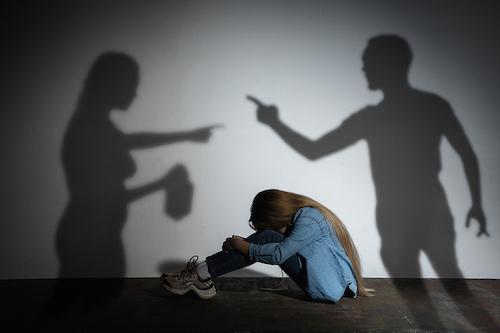October 31, 2023
by Elizabeth Pratt

People who bought firearms at the height of the COVID-19 pandemic have higher rates of mental health problems and political extremism.
Research published in PLOS One found those who bought firearms during the pandemic had higher rates of self harm, suicidal thoughts and intimate partner violence when compared with those who don’t own firearms or other firearms owners who bought firearms outside the height of the pandemic.
[More]
May 27, 2022
by Elizabeth Pratt

More than 20% of adults who were exposed to chronic levels of parental domestic violence in childhood develop major depressive disorder at some stage.
Researchers from the University of Toronto found that 22.5% of adults who witnessed domestic violence between parents later developed major depressive disorder, compared with 9.1% of those who hadn’t witnessed parental domestic violence as children.
[More]
There are many types of abuse and all are difficult to endure. Physical, sexual, emotional, financial and verbal cruelties are among the various forms of mistreatment that our society faces daily. Another type of brutality that is widespread and difficult to address is domestic abuse. Domestic violence has been a concern in our society for decades.
[More]
February 28, 2016
by Henry M. Pittman, MA

Drug abuse has haunted society for years. From dealing with alcohol to cocaine, from marijuana to LSD, the war on drugs continues. A drug that is becoming more and more popular is methamphetamine.
[More]
On May 27, 2015 a brown, 38 pound, 15-month-old Staffordshire/pitbull mix, named Caitlyn was found with electrical tape tightly wrapped around her muzzle in Charleston, South Carolina. This abuse exposed her to many life-threatening situations. Caitlyn’s tongue was caught between her teeth, which resulted in the blood flow to her tongue being cut off. She could not bark, eat, pant to cool herself, defend herself or pick anything up. For all intents and purposes, Caitlyn was cut off from the world. It is estimated that she suffered for 36 - 48 hours.
[More]
In April 2015 Robert M Gates, the national president of the Boy Scouts of America, addressed his organization at their national business meeting (BSA, 2015). In his speech he raised the thorny issue of gays in the Scouts. The organization had long held in place a ban on atheists, agnostics, and what they call "open or avowed" homosexuals participating as members (BSA, 2012).
[More]
Dating is supposed to be a time for teens to explore relationships and learn about themselves. It is supposed to be fun--and safe. But sometimes things go terribly wrong. Too often, teens are resorting to emotional and physical violence to resolve conflicts and manage painful feelings. Teens and their loved ones must be able to recognize abusive behavior in relationships, and know how to safely leave a relationship and get help.
[More]
October 28, 2013
by Ashley Marie

October is Domestic Violence Awareness Month. It was a typical Thursday. I was tucked away in my room and.....
[More]
August 19, 2013
by Ashley Marie

Bullying is a concern for parents, teachers, and children. And this challenge is becoming evermore complex as traditional bullying behaviours are taking new forms on the Internet.
School will be in session again.
Mothers are scanning flyers from department stores to snatch the latest deal on school supplies. Fathers are planning their morning and afternoon pick-up and drop-off schedules. Girls are picking out their outfit for the first day of school. Boys are gearing up for soccer tryouts.
And bullies are cracking their knuckles.
Bullying is no small challenge, and its harmful effects span across North America.
As discussed in the news this past week, Rehtaeh Parsons, a high school student in Nova Scotia, attempted suicide and passed away this year after a series of incidents of cyber bullying. The perpetrators distributed multiple photos of her online and physically raped her.
In Canada, 1 in 3 students are bullied during the academic year.[1] Sadly, of 35 countries that were studied internationally, Canada had the 9th highest rate of bullying for students at the age of 13.
In the United States, bullying has increased over the last decade.[2] Researchers estimate that 1 in 5 students are bullied over the course of an academic year, and 8% of students report to have bullied others.
Bullying Defined
Bullying involves a perpetrator who intends to harm its victim(s) emotionally and/or physically.[3] Moreover, it includes repeated incidents of emotional and/or physical aggression and is characterized by a power imbalance between two or more individuals.
According to the Canadian Council on Learning, bullying can be broken down into four broad categories: (1) physical bullying, (2) relational bullying, (3) verbal bullying, and (4) electronic bullying.[4] The last of these is a recent phenomenon that is becoming evermore dominant.
Cyber Bullying
Cyber bullying involves online forms of aggression, such as forwarding private photos or information of the victim or writing malicious comments directed at the victim on social networking sites.
Typically, there are more female than male victims of cyber bullying.
In Canada, 73% of victims of cyber bullying reported receiving aggressive emails or instant messages.[5]
In the United States, 1 in 5 teenagers has been cyber bullied and approximately the same number of teenagers have been a cyber bully.[6] Studies show that there is frequently a relationship between online and in-person bullying. Cyber bullying tends to contribute to social exclusion for female victims and tends to result in physical bullying for male victims.
It Often Starts At Home
Researchers have found that the issues that trigger bullying often stem from family dynamics at home.[7] Parents who do not provide a caring environment can harmfully affect their children, who in turn express their discontentment at school. Once the pain of life at home reaches a breaking point, children are more likely to act aggressively towards others.
It Usually Happens at School
Though the triggers that produce bullying behaviour tend to begin at home, the act of bullying typically occurs at school. Studies show that bullying occurs most prominently during recess and in the classroom.[8] Children commonly find their social life at school, so incidents of bullying are more likely to occur on school grounds.
In addition, bullies commonly seek a wider audience to which they can display their power over another. This is especially the case when teachers or supervisors are not present. For instance, schoolyards often lack sufficient supervision, making it easier for bullies to act aggressively towards their victim(s) without any punishment.
How Parents Can Help a Victim of Bullying
Though children do not always tell an adult about incidents of bullying, those who do tend to turn to their parents for help. In fact, 1 in 3 children turn to their mother or father.[9] This is a great time to asses how life for your child is in general- how is their self esteem etc. A Family Counselor can help to assist in communication with your children and working through issues you may not feel confident tackling.
But for those parents whose children have remained silent, these are some warning signs to look out for: unexplained scratches or bruises, unexplained damaged belongings, fear of walking to school or home from school, unpredictable mood swings, anxiety, poor academic performance, and having few friends.
How Parents Can Help a Perpetrator of Bullying
Once an incident of bullying has been identified, the family of the perpetrator of bullying should be notified. Because bullies commonly grow up in dysfunctional families, researchers recommend that schools involve their parents in the process of preventing future incidents of bullying. When parents must commit to actively helping their child, the positive result can be more sustainable in the long run. There are lots of stresses for Parents with back-to-school coming, to get some perspective on this read more here.
Increasing Awareness About Cyber Bullying
In the digital age that we live in, it is also important to help children navigate online social interactions. Social media sites and online forums are often the arena in which modern forms of bullying take place. Parents and teachers can educate children about proper online etiquette and inappropriate behavior. If the triggers of bullying behavior are stopped at home and in the classroom, then we can help decrease incidents of bullying overall.
[1] Canadian Bullying Statistics. 2012. Canadian Institutes of Health Research. [online] Available at: <http://www.cihr-irsc.gc.ca/e/45838.html>
[2] Bullying and Adolescent Health. 2011. Office of Adolescent Health. [online] Available at: <http://www.hhs.gov/ash/oah/news/e-updates/eupdate-7.html>
[3] Bullying in Canada. 2008. Canadian Council on Learning. [online] Available at: <http://www.ccl-cca.ca/pdfs/LessonsInLearning/Mar-20-08-Bullying-in-Canad.pdf>
[4] Ibid.
[5] Canadian Bullying Statistics. 2012. Canadian Institutes of Health Research. [online] Available at: <http://www.cihr-irsc.gc.ca/e/45838.html>
[6] Bullying and Adolescent Health. 2011. Office of Adolescent Health. [online] Available at: <http://www.hhs.gov/ash/oah/news/e-updates/eupdate-7.html>
[7] Rigby, K. 2007. Bullying in Schools and What to Do About It. Victoria, Australia: Acer Press.
[8] Ibid.
[9] Ibid.
The origins of Thanksgiving have nothing to do with a bunch of Indians and pilgrims sitting down for a bountiful feast of turkey. In reality although the settlers with pale faces had been bothering the Indians in addition to giving them many new diseases they had never had were starving by this time. The Indians took pity on them and brought them some corn and fish. Thanksgiving has a lot of emotional disappointment and this article will show you how to deal with this.
This is a period of time in which you are expected to give to others and be generous. Although the intention is good it often leads to self sacrifice and disappointment. This is a period of time in which you must balance your newfound humanitarianism with the demands on your own life. If you do not continue to reach your own immediate goals either at work or at home you will find yourself being irritable and exhausted. Remember that an obligation to give to others does not mean that you have to sacrifice your own needs. You must remember to give yourself some time for your own physical and mental well-being. It is a time when we most often neglect the things we do to make ourselves happy and keep ourselves balanced like exercise, yoga, or other spiritual practices for your own physical and mental well-being This is a time to find some positive solutions to deal with your family members past resentments. Remember that when I family system gets back together it quickly returns to whatever difficulties encountered before. Even if you're the only person in the room aware of this it may help you from dealing with the fallacy that "now that we're all together we must be alright."
This leads to the need to decide on your priorities and organize your time adequately. I this will counteract your feelings that you have not a planned enough for Thanksgiving. If you find additional time you can always volunteer to feed the poor would do random acts of kindness. You may also need to have planned out some unstructured inexpensive holiday activity because this holiday evokes a feeling of being served good food rather than organizing fun things to participate in. Spending some time thinking about this will save the day when you are reunited with your family and no one knows what to do.
One of the major fallacies are that Thanksgiving will take away feelings of loneliness, sadness, fear, anger and frustration. This holiday is heavily advertised is a time in which everyone appreciates being together. The fallacy behind that becomes clear when you are reuniting with family members and you realize why you have become independent of them. You may find yourself being overwhelmed with anger or fear or worse yet feeling alone being surrounded by your family. The worst emotion that creeps up on this holiday is resentment. It is usually triggered by a previous bad relationship with a family member. Beware of grudges and slights you have suffered in the past and keep them from resurfacing.
Thanksgiving is designed to encourage gluttony. This is not an open invitation to eat too much. Remember that most people with eating disorders simply want to have something to control in their lives and to avoid the resentment and self-hatred you will naturally feel after eating way past feeling hungry. This includes other over indulgences. You know by now what you need to keep a careful eye on so that you don't lose control and this may be an opportunity to set an example with other family members who still have raging addictions. You may want to have some contingency plans when they become abusively angry, drunk or chemically impaired.
If it the end of the holiday feast you find yourself still feeling depressed or resentful remember what the Indians did. They didn't like these foreigners who is strange customs and behaviors showed such a resentment towards nature that it disrupted and destroyed the Indian culture. Yet they still took pity on these poor starving people and threw them a fish or two.